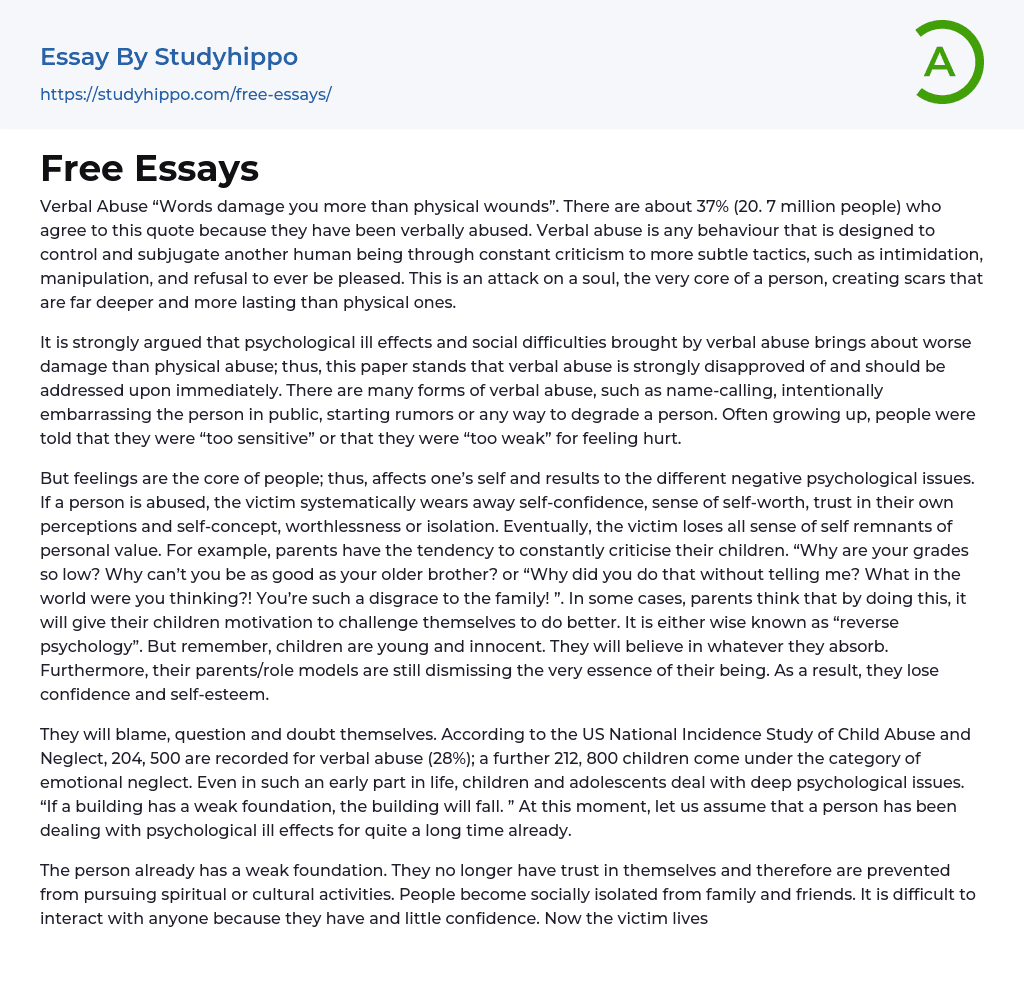Verbal Abuse “Words damage you more than physical wounds”. There are about 37% (20. 7 million people) who agree to this quote because they have been verbally abused. Verbal abuse is any behaviour that is designed to control and subjugate another human being through constant criticism to more subtle tactics, such as intimidation, manipulation, and refusal to ever be pleased. This is an attack on a soul, the very core of a person, creating scars that are far deeper and more lasting than physical ones.
It is strongly argued that psychological ill effects and social difficulties brought by verbal abuse brings about worse damage than physical abuse; thus, this paper stands that verbal abuse is strongly disapproved of and should be addressed upon immediately. There are many forms of verbal abuse, such as name-calling,
...intentionally embarrassing the person in public, starting rumors or any way to degrade a person. Often growing up, people were told that they were “too sensitive” or that they were “too weak” for feeling hurt.
But feelings are the core of people; thus, affects one’s self and results to the different negative psychological issues. If a person is abused, the victim systematically wears away self-confidence, sense of self-worth, trust in their own perceptions and self-concept, worthlessness or isolation. Eventually, the victim loses all sense of self remnants of personal value. For example, parents have the tendency to constantly criticise their children. “Why are your grades so low? Why can’t you be as good as your older brother? or “Why did you do that without telling me? What in the world were you thinking?! You’re such a disgrac
to the family! ”. In some cases, parents think that by doing this, it will give their children motivation to challenge themselves to do better. It is either wise known as “reverse psychology”. But remember, children are young and innocent. They will believe in whatever they absorb. Furthermore, their parents/role models are still dismissing the very essence of their being. As a result, they lose confidence and self-esteem.
They will blame, question and doubt themselves. According to the US National Incidence Study of Child Abuse and Neglect, 204, 500 are recorded for verbal abuse (28%); a further 212, 800 children come under the category of emotional neglect. Even in such an early part in life, children and adolescents deal with deep psychological issues. “If a building has a weak foundation, the building will fall. ” At this moment, let us assume that a person has been dealing with psychological ill effects for quite a long time already.
The person already has a weak foundation. They no longer have trust in themselves and therefore are prevented from pursuing spiritual or cultural activities. People become socially isolated from family and friends. It is difficult to interact with anyone because they have and little confidence. Now the victim lives in a constant state of hyper-awareness. They close their windows from day-to-day experiences or interactions. As a result, they are unable to move on and grow into the person they are ought to be.
Even with this, the victim isn’t the only one who gets affected. The victim often struggles with feelings of powerlessness, hurt, fear and anger. Ironically, abusers tend to struggle with these same
feelings. Abusers are also likely to have been raised in emotionally abusive environments and they learn to be abusive as a way to cope with their own feelings of powerlessness, hurt, fear and anger. Consequently, abusers may be attracted to people who see themselves as helpless or who have not learned to value their own feelings, perceptions or viewpoints.
This allows the abuser to feel more secure and in control and avoid dealing with their own feelings and self-perceptions. Verbal abuse happens every year at alarming rates. According to Doyle’s research, it revealed that children experience these behaviours from the abuser: rejection (86%); isolating (54%); degrading (53%); ignoring (28%); corrupting (19%) and tormenting (18%). Also it revealed that in a population survey of 504 respondents, 29% had been emotionally abused by carers; compared to 9% who had been sexually abused, and 14% who had been physically abused.
In conclusion, verbal abuse is an emotional abuse which injures the very person that you are and affects the emotions of the victim. This abuse makes children feel insecure, depressed, worthless, fear, isolated and socially awkward. With that, it is strongly disapproved of due to its long lasting effects they leave behind. It is important that people act now to help the children you know who are verbally abused because they are the hope for a better generation in the future.
- Bullying In Schools essays
- Anatomy and Physiology essays
- Addiction essays
- Biodegradation essays
- Dental Care essays
- Disease essays
- Disorders essays
- Health Care essays
- Intelligence Quotient essays
- Nutrition essays
- Olfaction essays
- Public Health essays
- Women's Health essays
- World health organization essays
- Cancer essays
- Infectious Disease essays
- Lung Cancer essays
- Neurology essays
- Physical Exercise essays
- Medicine essays
- Sex essays
- Inquiry essays
- Disability essays
- Poison essays
- Action Potential essays
- Nervous System essays
- Childbirth essays
- Puberty essays
- Blood essays
- Kidney essays
- Neuron essays
- Body essays
- Glucose essays
- Sense essays
- Heart essays
- Skeleton essays
- Human Physiology essays
- Eye essays
- Immune System essays
- Muscle essays
- Skin essays
- Brain essays
- Central Nervous System essays
- Human Skin Color essays
- Digestive System essays
- Common sense essays
- Respiration essays
- alcoholism essays
- Smoking essays
- Casino essays




